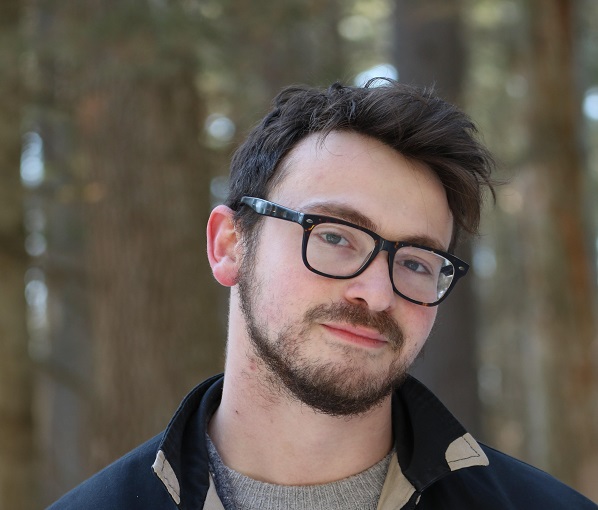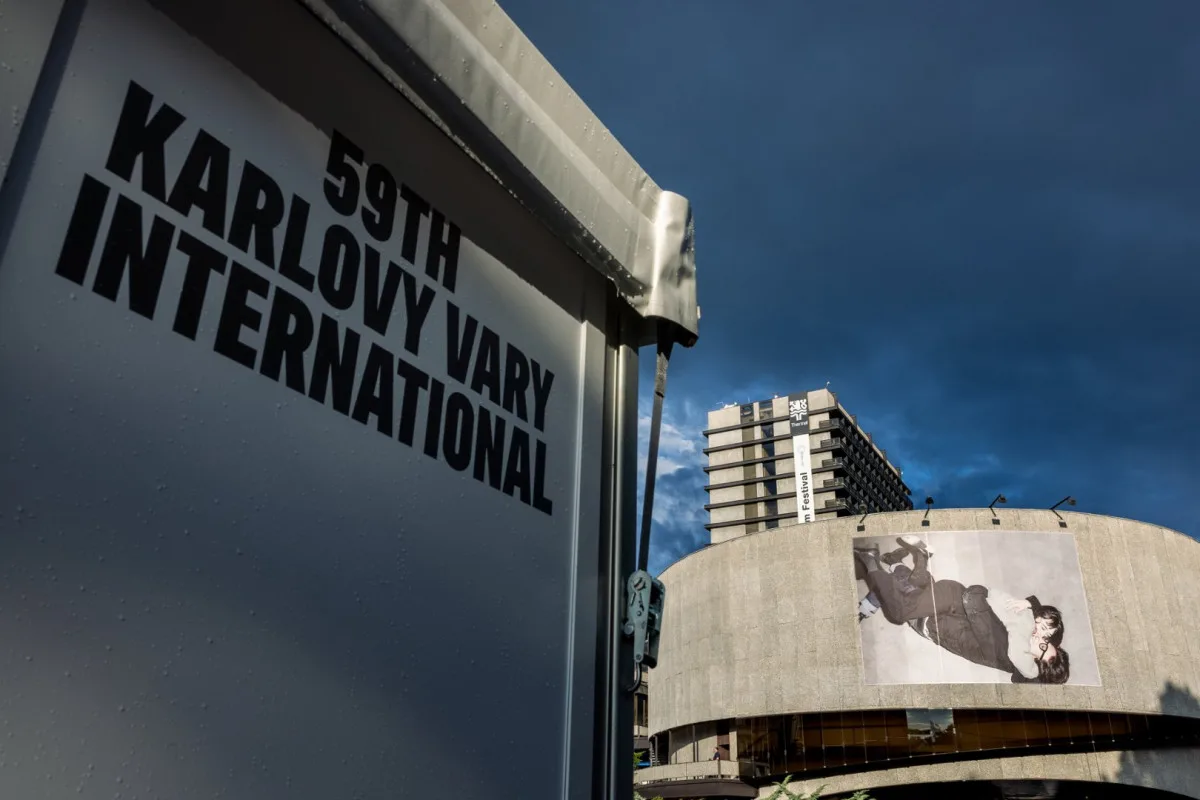One of the world’s oldest film festivals, and the most prestigious such festival in Central and Eastern Europe, the Karlovy Vary Film Festival kicked off its 59th edition Friday night with an opulent opening ceremony, at which poignant tributes to the festival’s late president shone as bright as a theatrically choreographed dance-and-lights display later-evening fireworks that vividly illuminated this westernmost corner of the Czech Republic.
Nestled in the hills of western Bohemia, less than a two-hour drive from Prague, the fabled spa town of Karlovy Vary attracts visitors year-round for its healing mineral springs and magnificent architecture, both of which seem more magical for the scenic forests that envelop them. Clouds of steam abound as evidence of subterranean hot water from thermal springs that flow into the confluence of the Teplá and Ohře rivers, where the town is situated. This vapor adds to the air a mirage-like shimmer. Meandering through Karlovy Vary, time itself can feel suspended.
Indeed, Karlovy Vary’s exquisite atmosphere imparts a certain serenity even during the festival, which brings a vast international delegation to town each July, screening hundreds of films that comprise a vast cross-section of contemporary arthouse cinema. It wouldn’t have been right to devote one’s first day in such a picturesque place to the inside of one of the city’s many movie theatres, though even these rank among Europe’s most beautiful. Strolling riverside on Friday down Karlovy Vary’s main promenade, past narrow cobblestone streets that snake between centuries-old buildings with pastel-painted facades, there was a faint taste of salt in the air, and throngs of passersby became increasingly well-dressed as the evening’s festivities approached.
Friday’s opening ceremony was held at the Hotel Thermal, which serves as the central venue for the festival. A towering, exposed-concrete complex in the city’s historical center, the Hotel Thermal is visible from a great distance. Approaching it each day brings one past drinking fountains and Corinthian columns, through colonnades of wood, stone, and cast-iron, but the Thermal itself is another sort of spectacle.
Purpose-built in the mid-1960s by Czech architects Věra and Vladimír Machonin as a festival palace in the heart of Karlovy Vary, its brutalist design—emblematic of the relative architectural freedom that existed in Czechoslovakia at that time—is most striking today for its proximity to the colorful art nouveau styles that otherwise populate this oasis of sandstone statues and spa houses. Czechoslovakia was occupied in 1968, while the Thermal was under construction; this did not prevent its completion, though many of its artistic contributors were blacklisted after the Warsaw Pact invasion, rendering the structure a complex symbol of history made concrete.
With few exceptions, all of the festival’s screenings take place between the Thermal and the ornate Grandhotel Pupp across town, whose neo-baroque facade inspired Wes Anderson’s “The Grand Budapest Hotel.” (It was also a stand-in for Montenegro’s Hotel Splendide in pivotal sequences of “Casino Royale.”) Inside the Thermal, amid a sea of tuxedos and evening gowns, attendees walked the red carpet and toasted one another with glasses of champagne before heading inside the Grand Hall, a 1,131-seat venue that serves as the festival’s main stage.
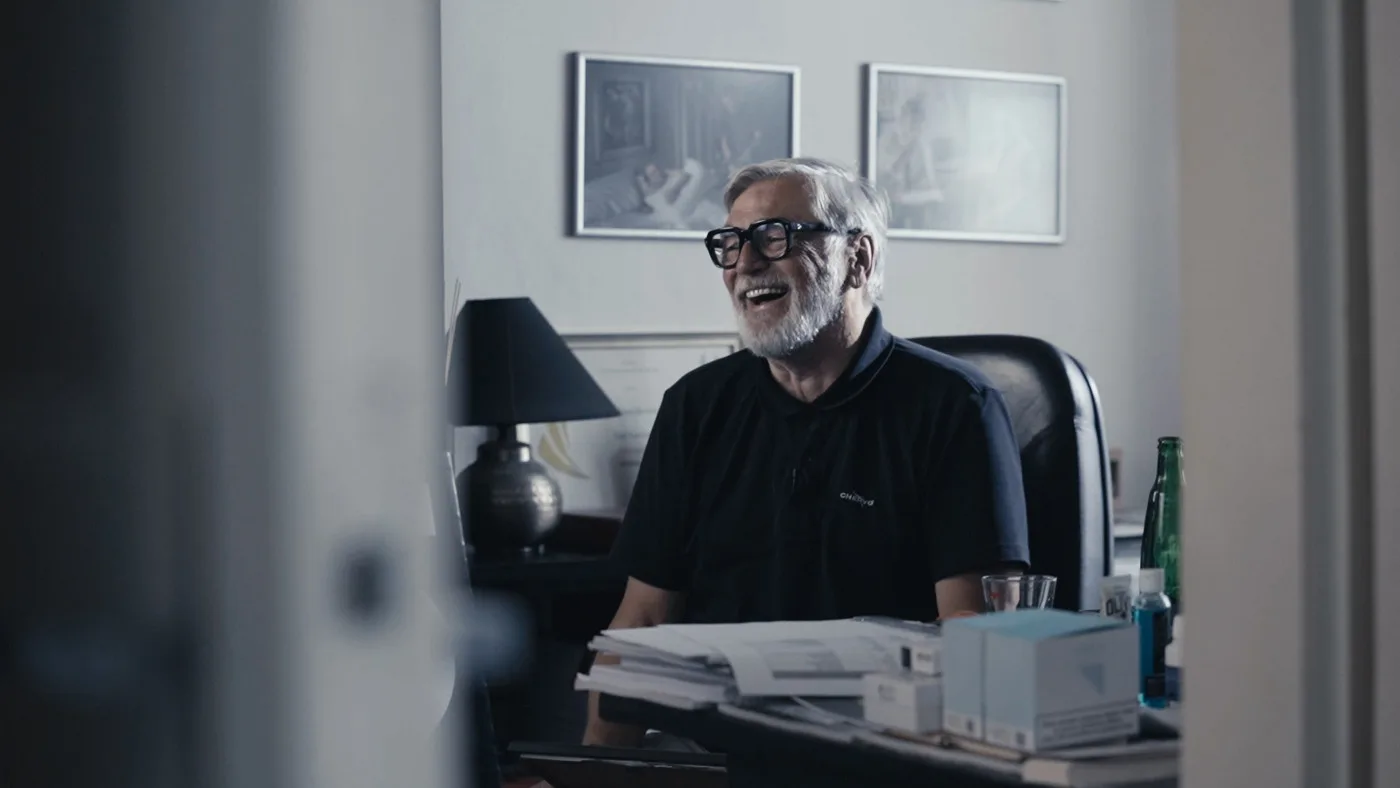
A Night for Remembrance
As is festival tradition, brothers Michal and Simon Caban choreographed an elaborate opening performance to kick off Karlovy Vary, this one featuring dancers interacting with multivalent cones of light. At one point, they literally dazzled the audience with a dancer whose elaborate, hall-of-mirrors headpiece sent an array of beams coruscating around the venue.
Organizers struck a bittersweet note in other areas of the opening ceremony, which was to be expected given the passing—in early May of this year—of Czech actor Jiří Bartoška, who’d served as president of KVIFF since 1994. Although the festival was founded in 1946, political pressures had forced organizers to alternate it with the Moscow Film Festival year by year until 1993; it was Bartoška, together with film critic and journalist Eva Zaoralová, who was primarily responsible for reshaping Karlovy Vary into the annual destination for world cinema that it is today. Even outside of his estimable acting career, Bartoška was in this respect a lion of the European film industry; he was “our Robert Redford,” explains Tatiana Detlofson, International Representative of the Karlovy Vary Film Festival, whose work with the festival dates back decades.
In honor of Bartoška, the festival’s opening film screening was of “We’ve Got to Frame It! (a conversation with Jiří Bartoška in July 2021),” a documentary feature directed by Jakub Jurásek and Milan Kuchnya that finds its subject reflecting—insightfully, and with rakish good humor—on his long and varied life in the Czech performing arts. From his years at performing-arts theatres in Brno, to his time in Prague, first during a residency and then at theatres co-founded by colleagues, to his emergence as a film star and subsequent association with the festival, Bartoška found his way through the constantly evolving arts scene and never stopped changing alongside it.
Through the turbulence of the Velvet Revolution (after which the film festival fell on difficult times and required rehabilitation) and up through his final years overseeing KVIFF, Bartoška became an icon, meeting and often personally securing the festival’s all-important international guests. A film seemingly made to be seen by Czech audiences in a setting like Karlovy Vary, “We’ve Got to Frame It!” covers a lot of ground, encompassing many of Czech cinema’s most beloved and influential figures; the audience’s delighted sounds of recognition and amused appreciation in the Grand Hall made it clear this was for many a deeply personal occasion for catharsis and remembrance.
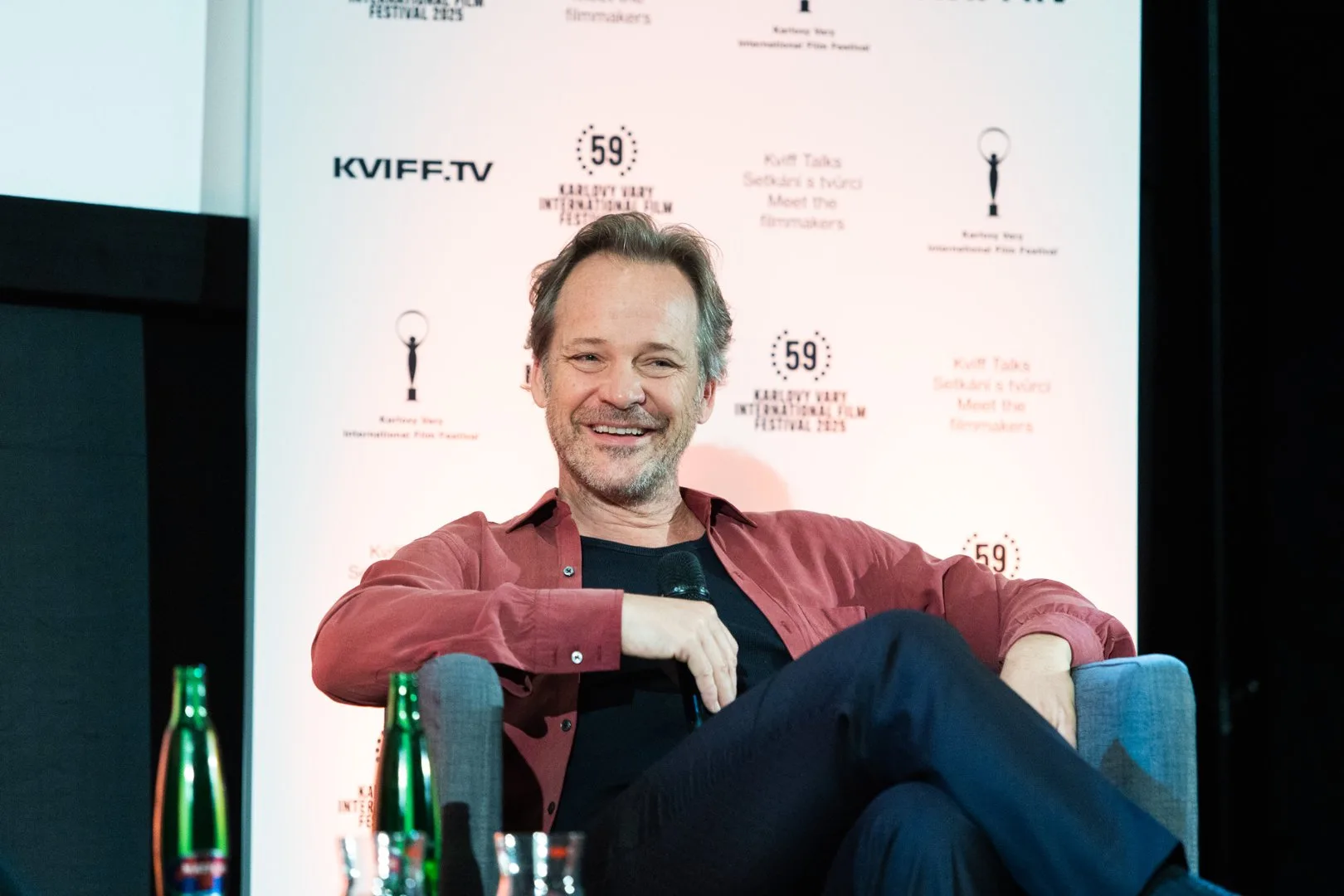
Vicky Krieps and Peter Sarsgaard Salute Cinema and Denounce Fascism
With acclaimed actors Vicky Krieps (“Phantom Thread”) and Peter Sarsgaard (“Memory”) both honored during the ceremony as recipients of KVIFF Presidents’ Awards, the opening night had star power to spare. Krieps—whose tribute was a Saturday screening of the French drama “Love Me Tender,” which recently premiered in Un Certain Regard at Cannes—responded to a standing ovation with brief, contemporaneous gratitude. “I love film festivals,” she said. “They are just the best thing in the world, together with cinema. And if movies are not misused, they can go across borders and transfer the most powerful messages. They do not ask for your passport, or where you’re from, or how much money you have… We should protect them, so they can continue to spread love, peace, and—above all—forgiveness.”
Sarsgaard—whose tribute was a Sunday screening of journalism drama “Shattered Glass,” from 2003—“Making a film is a collective action,” he reflected, “but any actor will tell you that good work is only possible in an environment that supports it.” Praising directors like Michel Franco (whose “Memory” won Sarsgaard the prestigious Volpi Cup for best actor in Venice), Billy Ray (“Shattered Glass”) Lone Scherfig (“An Education”), and his wife Maggie Gyllenhaal (“The Lost Daughter”), he affirmed, “There is no going it alone,” reflecting as well on the disturbing current state of U.S. culture and politics.
“As my country retreats from its global responsibilities and tries to go it alone, it is also being divided into factions from within: factions of politics, gender, sexuality, race, Jews split over the war,” he said. “But when there’s a common enemy, there is no going it alone. The enemies are the forces that divide us, that individuate us. We all know who they are. Collective action is the only way forward in art and in our happiness.” To murmurs of collective approval from the hall, Sarsgaard concluded by quoting Václav Havel, former president of Czechoslovakia: “One half of a room cannot remain forever warm, while the other half is cold.”
British electro-pop duo La Roux performed an open-air concert in front of the Hotel Thermal later in the evening; as their ecstatic vocals and sugar-high synth beats reverberated through Karlovy Vary, few in attendance resisted dancing along to the catchy chorus of their ’80s-toned hit “Bulletproof,” and the fireworks display that followed was lavish enough to bathe guests in throbbing, incandescent hues almost as vibrant as those exhibited throughout the town by day.
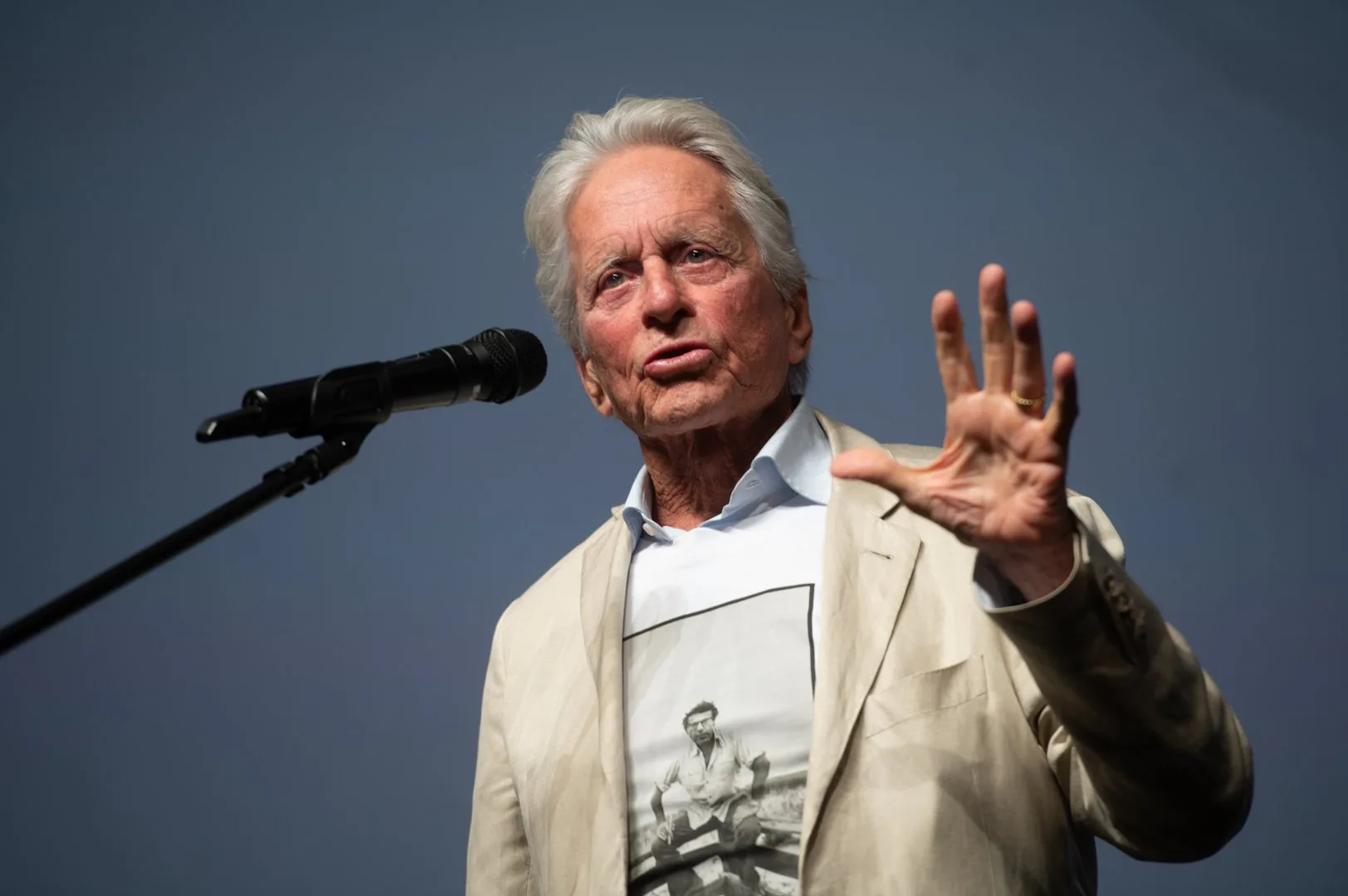
Michael Douglas and Dakota Johnson Receive Special Awards
Saturday saw American actor Michael Douglas return to Karlovy Vary for the first time in over a quarter-century. He previously attended the festival in 1998, receiving the festival’s prestigious Crystal Globe award for outstanding artistic contribution to world cinema. (Stellan Skarsgård will be in town later this week to collect the same award and present the film “Sentimental Value,” which won the Grand Prix at Cannes this year.)
This time around, Douglas was on hand to introduce a newly restored version of Miloš Forman’s “One Flew Over the Cuckoo’s Nest,” celebrating the 1975 masterpiece—the second of only three films ever to sweep all five major categories at the Academy Awards—on the occasion of its 50th anniversary.
Having co-produced the film, which won him the Oscar for best picture, Douglas reflected in Karlovy Vary that he owed his involvement in the project to his father, the actor Kirk Douglas, who’d played Randle McMurphy on stage more than a decade before Jack Nicholson’s take on the character. The older Douglas, eager to play McMurphy in a movie adaptation, had retained the film rights but was unable to find collaborators who’d help him make it.
“I have to thank my father, Kirk, for getting the rights to the book,” Douglas told the audience. “He tried to get it made as a movie for many years, and he couldn’t, and he was going to sell it, and that was when I stepped in and I said, ‘Dad, please, please don’t sell this.’ I never thought about being a producer, but I loved this project so much. So I thank my father for giving me that opportunity and not selling it.”
Douglas appeared in Karlovy Vary alongside co-producer Paul Zaetz and members of the Forman family; one of the most prominent figures of the Czechoslovak New Wave of the 1960s, the late Forman had a long-standing relationship with Karlovy Vary, a personal friendship with Bartoška, and had been previously awarded the Crystal Globe. On stage, KVIFF executive director Kryštof Mucha bestowed a new Crystal Globe statuette upon Douglas, as his previous one had an earlier, wafer-shaped look that festival organizers deemed harder to hold than the new statuette. At a press conference later in the day, Douglas declared, “They upgraded me!”
At that same press conference, Douglas reflected on the “timeless” appeal of Forman’s anti-establishment classic, about the battles for freedom between rebellious patients and disciplinarian authority figures at a state mental hospital. Reflecting on “how precious democracy is, how vulnerable it is, and how it always has to be protected,” Douglas decried the state of U.S. politics in the second Trump administration.
“Our country is flirting with autocracy, [akin to] some other democracies in this world,” Douglas said. “And I hope that what we’re struggling with right now is a reminder of all of the hard work the Czech did in terms of gaining their freedom and their independence… Democracy is not to be taken for granted. I think it reminds us that we all need to make our efforts. It’s not the job of somebody else.” While Douglas has “no real intentions” to act again, he said he’d return “if something special came up.” Otherwise, “in the spirit of maintaining a good marriage,” he joked, he’s just “happy to play the wife” to actress Catherine Zeta Jones.
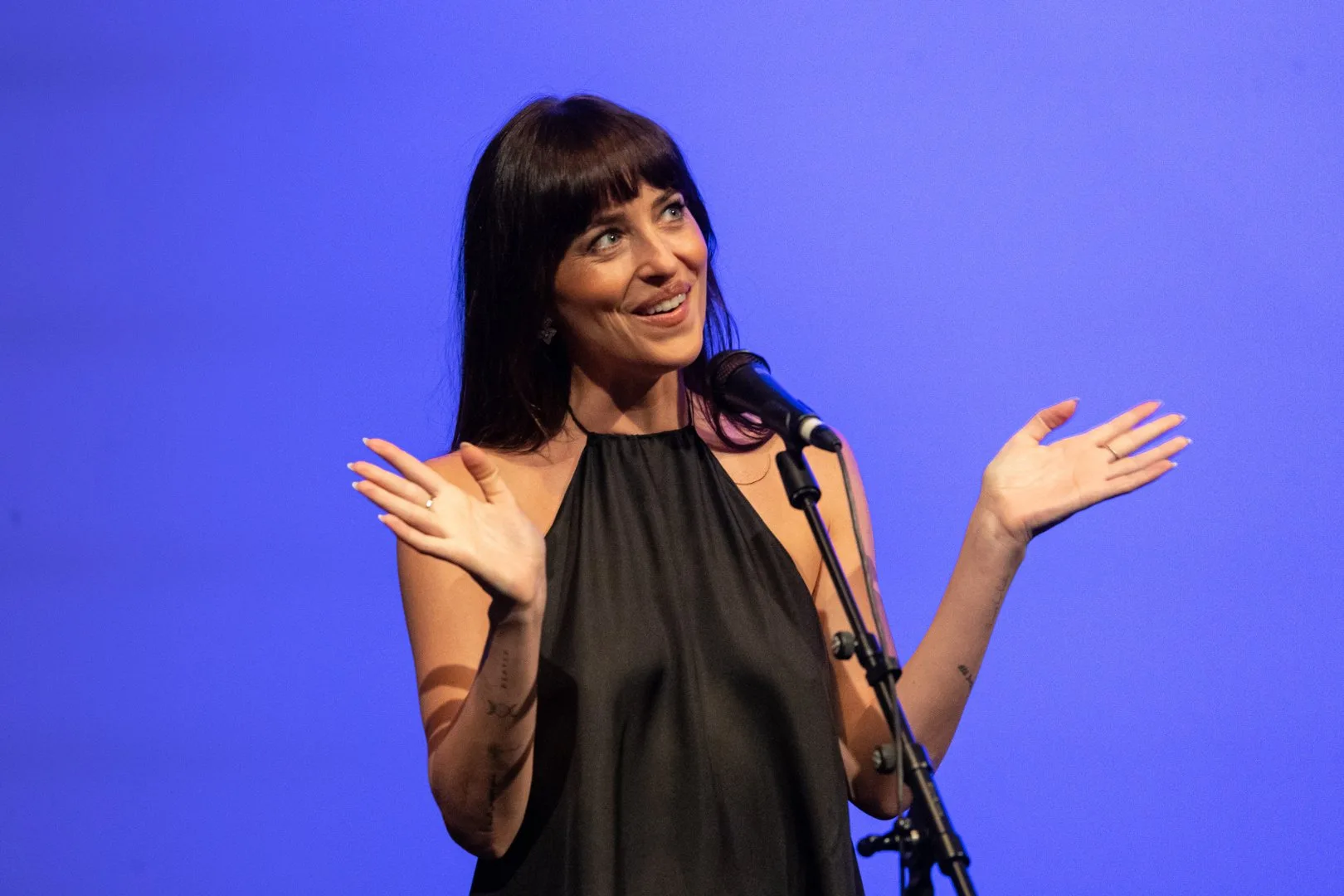
Also in Karlovy Vary over the weekend was the actress Dakota Johnson, who received a KVIFF President’s Award; her latest films, “Splitsville” and “Materialists,” both screened at the festival. (Though “Materialists,” by writer-director Celine Song, is already out in U.S. theaters, it has not yet opened theatrically in the U.K. and Europe, unexpectedly turning a Sunday-night screening introduced by Johnson into one of Karlovy Vary’s hottest tickets.)
Praising Song as “an exceptional creator and probably the best filmmaker of our time,” after a standing ovation that preceded the film, a visibly emotional Johnson thanked the audience in Czech. He said, “I hope it makes you cry, laugh, and consider your own lives.” Johnson was also on hand for the Saturday screening of “Splitsville,” calling it a “film about love, friendship, and the complexity of human relationships’ during a brief introduction.
During Sunday’s press conference, Johnson revealed that she’s preparing to direct her first feature: a collaboration with Vanessa Burghardt, an up-and-coming actress who played her daughter in “Cha Cha Real Smooth.” The project is “really close to my heart,” she said. “I’ve always felt that I’m not ready to direct a feature,” said Johnson. “I don’t have the confidence. But with her, I feel very protective, and I know her very well, and I just won’t let anybody else do it.”
Johnson advocated for more women-centered stories and spoke of her desire to “avoid toxic sets.” Johnson has also been increasingly active as a producer; “Splitsville” was produced via her TeaTime Pictures banner, which focuses explicitly on “visually or emotionally provocative” female storytelling, where the woman is different from what you see, and complex and nuanced, and maybe an anti-hero that you love.” It was Johnson’s first time at Karlovy Vary, as evidenced by her glowing reaction to her surroundings: “This place looks like Disneyland,” she exclaimed.
Across the festival’s opening weekend, there was rarely a quiet moment in Karlovy Vary; one oft-expressed sentiment by the locals is that all of the Prague film industry travels in for at least the festival’s first few days, resulting in more foot traffic—plus traditional Czech food carts, beer and wine stalls, and concerts at musical stages visible all up and down the promenade—than at any other point in the year.
And so it’s a testament to the revitalizing power of Karlovy Vary itself that, even in its abundance of sights and sounds, the film festival has thus far retained the warm and welcoming aura of a spiritual retreat, rather than a stress test—unusual, as attendees at most festivals of similar scale and circumstance can attest. Excitingly, the first few days of film screenings around town—to be covered in the following dispatch—have yielded an embarrassment of riches. But that’s only fitting for what’s clearly a bright-sparkling hidden gem of the global film-festival circuit.
